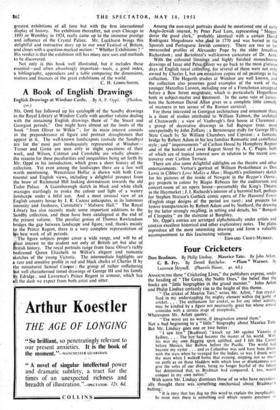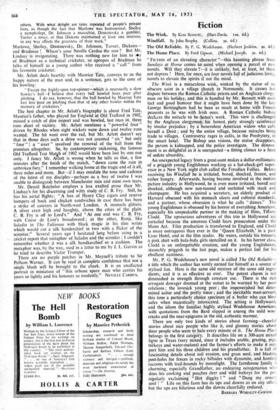Four Cricketers
Don Bradman. By Philip Lindsay. Maurice Tate. By. John Arlon.
ANNOUNCING these "Cricketing Lives," the publishers express, under the heading of "The Great, the Noble Ones," the belief that the books are "little biographies in the grand manner." John Arlott and Philip Lindsay certainly rise to the height of this theme. -
" The cricket of Maurice Tate," writes Mr. Arlott, " first crystal- lised in my understanding the mighty clement' within thc game of cricket. . . . The enthusiasm for cricket, as for any other activity. may be kindled by a figure not necessarily great but whose arrival coincides with a certain stage of receptivity.'
Whereupon Mr. Arlott quotes: "The worst are no worse, if imagination amend them." Not a bad beginning to a " little " biography about Maurice Tate. But Mr. Lindsay goes one or two better: "I saw him" [Bradman] "knock up 340 against Victoria at Sydney. . . . The boy'had become the master of his world. With his was my own flagging spirit uplifted, and I felt like Cortez before Mexico, like Balboa before the Pacific. The world had become my oyster ... and as Columbus was said have been drunk with the stars when he voyaged for the Indies, so was I drunk with the stars when I walked home that evening, stepping not so much on earth as on those bladders with which love or -drunkenness can give the soles of our shoes, being no longer fearful of the future but determined that, as Bradman had conquered, I, too, would conquer in my own métier."
With scorn Mr. Lindsay dismisses those of us who have occasion- ally thought there was, something mechanical about . Bradman's
batting: • "It is envy that has dug up this word to explain the inexplicabl:. In most men there is something evil which resents greatness in others. With what delight are tales repeated of people's private lives, as though the fact that Marlowe was homosexual, Shelley a nympholept, Dr. Johnson a masochist, Dostoievsly a gambler, Turner a miser, or that Dickens maintained at least one mistress, in any way affects the greatness of their work." Marlowe Shelley, Dostoievsky, Dr. Johnson, Turner, Dickens— and Bradman ! Whaur's your Neville Cardus the noo ? But Mr. Lindsay 'is invigorating. There was nothing new for him to :toy of Bradman as a technical cricketer, so apropos of Bradman he talks of himself as a young author who received a " call " from his favourite cricketer.
Mr. Arlott deals heartily with Maurice Tate, conveys to us the happy nature of the man and, in a sentence, gets to the core of his bowling: "Except the highly-spun top-spinner—which is necessarily a slow bowler's ball-1 believe that every ball bowled loses pace after pitching. I do say, however, that the ball bowkd by Maurice Tate lost less 'pace on pitching than that of any other bowler within the memory of cricketers."
The best chapter in Mr. Arlon biography is about Fred Tate, Maurice's father, who played for England at Old Trafford in 1902, missed a catch of dire import and was bowled, last man in, three runs short of victory. Mr. Arlott mentions a " powerful four " driven by Rhodes when eight wickets were down and twelve runs wanted. The hit went over the rail, but Mr. Arlott doesn't say that in those days such a drive was not counted " six " but only " four " ; a " sixer " involved the removal of the ball from the premise& altogether. So, by contemporary reckoning, the famous Old Trafford Test Matgh of 1902 would have been lost by one run only. I fancy Mr. Arlott is wrong when he tells us that, a few minutes after the finish of the match, " down came the rain in unbroken fury." I remember walking home at the tragic end of it all, three miles and more. But—if I may emulate the tone and cadence of the latest of my disciples—perhaps as a boy of twelve I was unable to distinguish between Manchester rain and mine own tears.
Mr. Denzil Batchelor employs a less exalted prose than Mr. Lindsay's for his discerning and witty study of C. B. Fry. Still, he has his aerial flights: " A box of Henry Clay cigars and reserve hampers of hock and chicken sandwiches in case there has been a strike of caterers in North-west London. A monocle glitters. A silver crest high and haughty, above the cities of the plain, C. B. Fry is off to Lord's." And " At one end was C. B. Fry, with Coeur de Lion's broadsword ; at the other, Ranji, like Saladin in The Talisman with black magic in his slim wrists which would cut a silk handerchief in two with a flicker of the scimitar." Several years ago I hesitated long before using in a cricket report that metaphor of Saladin and the scimitar ; I couldn't remember whether it was a silk handkerchief or a cushion. The metaphor was, by the way, used in a letter to me by J. L. Garvin as he tried to describe Victor Trumper. There are no purple patches in Mr. Meynell's tribute to Sir Pelham Warner. It can be read in complete confidence that not a single blush will be brought to the cheek. It is an unaffected portrait in miniature of " this urbane spare man who carries his years so lightly and his honours so modestly." Nmt t 1- C kRDUS.







































 Previous page
Previous page